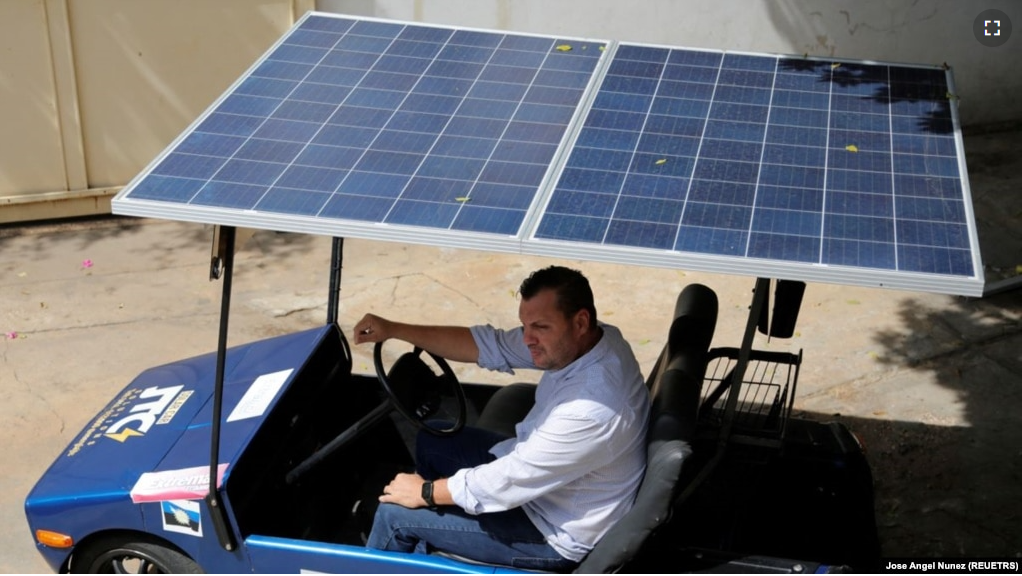In Venezuela, people often must wait in long lines to get fuel for their vehicles. Fuel shortages are common because oil production has dropped in the country. Poor maintenance and lack of investment by Venezuela’s state-owned oil industry are some reasons for the drop in production.
In Maracaibo, a once-wealthy oil city, two innovators have built small solar-powered and electric cars. And they are promoting the manufacture and use of these cars instead of vehicles that use fossil fuels.
José Cintron is a 43-year-old electrical technician. He developed a solar-powered car. Augusto Pradelli, 61, created a small electric vehicle that can also use solar panels. Both cars are built on the frame of old golf carts with more powerful batteries.
Cintron and Pradelli explained the benefits of solar energy. Pradelli said, “the beauty of solar charge is that as long as there is sun, the car is always charging. The sun is free, and that’s what you have to take advantage of.” And Cintron said, “solar energy is the future, we have to stop relying on fossil fuels.” He added that the change to solar energy will not happen in a very short period of time, and he said, “oil is not going to go away that easily.”
Both of the small vehicles can carry four people and travel between 25 and 40 kilometers per hour. The batteries that power them can be recharged with solar panels in 10 hours. They can be charged more quickly by using an electric charging point, Pradelli said.

The two men used their own money to build the small solar and electric cars. They hope to work together to develop a hybrid electric car. And they hope that one day the car will be produced nationally, a big dream in a country that was once one of the world’s top oil producers.
Maracaibo has a population of 2 million people. It is the second-largest city in Venezuela. Temperatures there are over 34 degrees Celsius almost all year. The heat makes walking uncomfortable. That is another reason less costly electric vehicles are an appealing choice.
Venezuelan President Nicolas Maduro saw Pradelli’s car at a science and technology event last month. Pradelli said Maduro expressed his support of the vehicle.
“The president told me: ‘Augusto, I’ll buy it from you,'” said Pradelli. He added that he told the president that he would need the support to produce it. He said that to manufacture the vehicles, an industry is necessary.
Speaking from his work area in Maracaibo, Pradelli said, “These electric motors don’t make noise, they don’t vibrate, they don’t pollute, they are the future. The world has to think about how to get out of pollution and global warming.”
I’m Andrew Smith.
The Reuters news agency reported this story. Andrew Smith adapted it for VOA Learning English.
____________________________________________________
Words in This Story
shortage –n. a lack of, not having enough of something (usually a material thing such as water, bread, oil, and the like)
maintenance –n. work done to keep something in good operating condition (usually used with machinery or physical systems, such as car maintenance, road maintenance, water system maintenance)
frame –n. the structure, casing, or support structure which makes the shape of an object, onto which other material is attached. For example, seats are attached to the frame of a car.
cart –n. a small vehicle for transport with a motor
battery –n. a device that stores electric energy. In cars it is a rectangular box containing acid. It provides the electricity needed to start the car.
hybrid –adj. describing a mixture of other things, especially two other things. In cars, it describes a mixture of two power sources, such as gasoline and electricity, or solar power and electricity.
uncomfortable –adj. causing physical irritation, pain, or a feeling that is not pleasing. For example, shoes that are too small may feel uncomfortable on the feet.
vibrate –v. to shake with small, quick movements, usually at a rate of many times per second. For example, the vocal cords in the throat vibrate when a person is speaking.
global warming –n. increase in the temperature of the earth’s atmosphere
